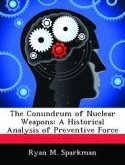The decline of the Soviet Union upset the world's balance of power and opened the door to third world proliferation since the superpowers no longer have tight control over their client-states. This increase in proliferation raised the issue of how the United States (US) should respond to a third world nation that is acquiring nuclear weapons. Should the United States depend on preventive attacks to stop the proliferation of nuclear weapons? This is not a new issue. Proliferation and preventive war have both been issues since the end of World War II. The United States considered a preventive attack against the Soviet Union in the postwar years. The Soviet Union considered preventive attacks against the People's Republic of China in 1969. Israel conducted a preventive attack in 198l against the Osiraq nuclear reactor in Iraq. Preventive attacks are politically untenable and are not militarily possible. Without perfect political conditions, it is unacceptable for the only remaining superpower to attack a second-rate power. It is militarily impossible for the United States to guarantee the removal of all nuclear weapons in a single preventive attack. This study concludes that the United States should not depend on preventive attacks to stop proliferation of nuclear weapons.
Hinweis: Dieser Artikel kann nur an eine deutsche Lieferadresse ausgeliefert werden.
Hinweis: Dieser Artikel kann nur an eine deutsche Lieferadresse ausgeliefert werden.








